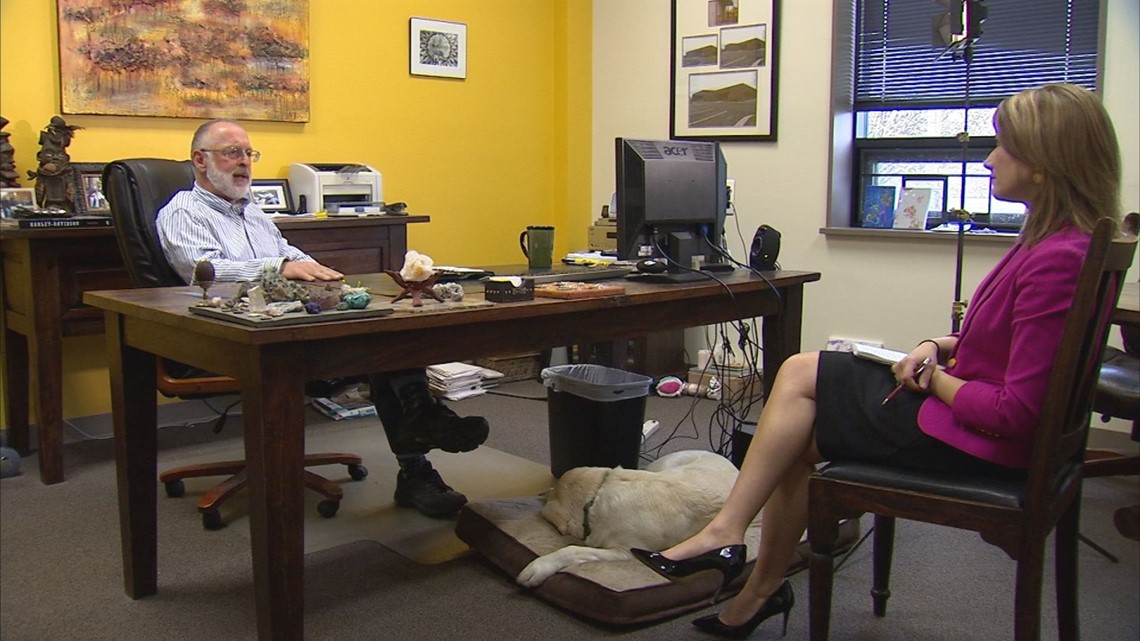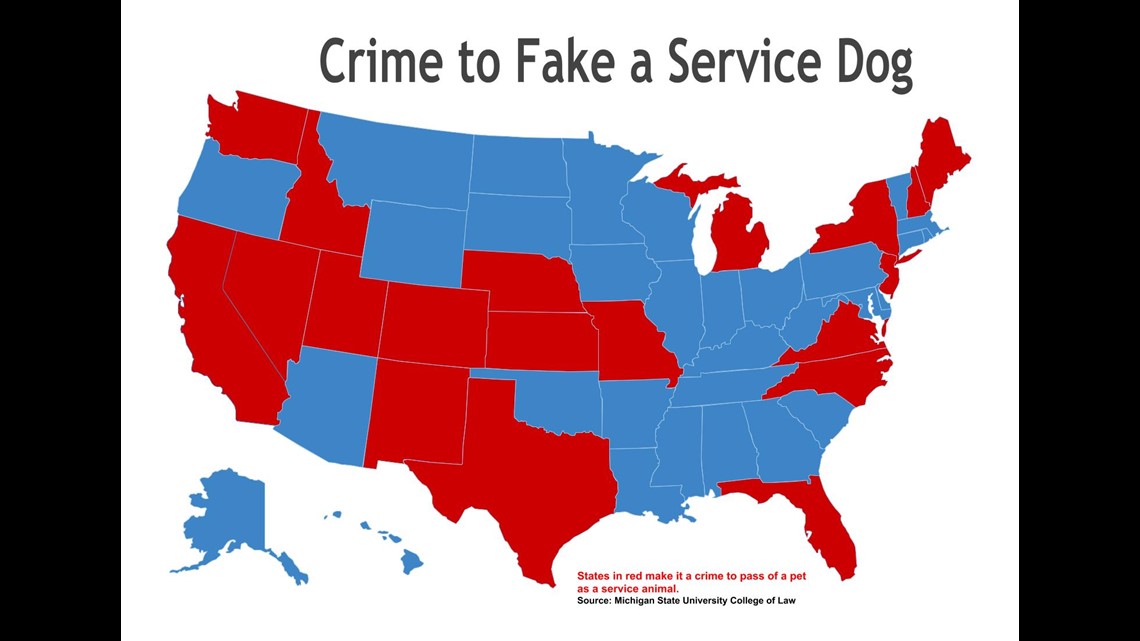INDIANAPOLIS (WTHR) - It's a sinister way of spending more time with your pet: pretending that your dog is a service animal, so they can go where they're really not allowed.
It's happening more often and causing people with real disabilities real problems.
Now Indiana and other states are cracking down to stop the fakes.
Who can forget the recent video of a woman trying to bring a peacock on an airplane, saying it was her emotional support animal.
That bird didn't fly. It got rejected by the airline.
But we have seen pigs fly and ducks, even kangaroos.
A growing use of legitimate service and support animals has unleashed a spike in people bending the rules to get ordinary, and extraordinary pets in public places.
"It's an issue. And it's a big issue," said Sally Irvin, founder of the Indiana Canine Assistance Network (ICAN), which trains service dogs in Indiana. "It's a person saying that I have a disability. An absolute lie. And therefore I need this dog to assist me."
Amanda Beery manages an Indianapolis hotel with a no pet policy.


She says every couple weeks, people try to scam the system.
"Probably last year is when I really noticed it being a lot more of an issue," Beery said.
Recently, she says a couple checked in with what they claimed were service dogs.
Then they left the dogs in the room.
"They ended up leaving the property and the two dogs in the room and they barked for over four hours," Beery said. "We finally got a hold of her to come back and we ended up having to remove her from property."
It's become such a problem, Beery now trains her employees how follow the law and spot a fake.
"Legit ADA certified guests know the rules. They know what we're allowed to ask," Beery said.
"The ADA says you can ask two questions. You can ask is that a service dog and what has it been trained to do, what tasks does it perform for its person," Irvin explained. "If your answer is to that proprietor 'he provides me comfort', you need to do education to folks and tell them that's not a service dog."
But we found it's all too easy to lie and appear convincing.
"Just Google it," Irvin said. "Because you type in 'service dogs', even 'service dogs Indiana' and the first three ads that show up, are the online registries for certification of service dogs or emotional support dogs."
Service dog registries, ID's and vests advertised online look legit.
But there's no proof of training.
A few clicks and some cash can get any pet so-called credentials.
We registered a friend's dachshund, which is not a service dog, by simply checking a couple of boxes and paying $69 for a "VIP Kit".
Here's the thing: real service dogs don't have to be registered and by law, no vest or ID is required.
"The first thing I want to say is they're useless," Irvin said. "They're worthless!"
The fraud is especially frustrating for Walt Alfred, whose service dog, Mo, keeps him out of diabetic danger.


"If he detects that my blood sugar is going low, then he will nudge me very aggressively," Alfred explained. "That happens four to six times a day. By pretending like your dog is a service dog, you're unknowingly creating issues for people who have a legitimate need."
Alfred says he now gets more scrutiny in stores from proprietors and he says untrained dogs, in places they shouldn't be, have tried to go after Mo.
He's also seen fakes, firsthand.
"In an airport, there was a lady there with a small, I don't even know what it was, a lhasa apso or whatever, a little small furry dog. I said 'oh I've never seen you know a small breed like that be a service dog' and she said ,'oh yeah, there's a lot of them' and I said, 'what service does he do for you?' Her response was 'everything'. So I was pretty sure that he was not a legit service dog," Alfred said.
"When we see these rogue dogs out there, it is disturbing because they're putting a lot of constituencies at risk. And that's just not ok," Irvin said. "Guide dog schools did some research and they said they're seeing anywhere from 12 to 15, there's one program that saw a 20% increase in their graduates complaining or telling them that they have been attacked by a dog that shouldn't have been there."
Irvin says part of the problem is plain old dishonesty.
The other is confusion between service and comfort animals.
They're not the same, according to the Americans With Disabilities Act.
Service dogs can legally go anywhere with their person.
They're highly trained and perform specific tasks and work for the disabled.
Emotional support animals or ESA's are not trained, but with permission, can travel on airplanes and live in normally pet-free apartments.
Both types are experiencing fraud.
In fact, Delta Airlines recently reported an 84% increase in animal incidents aboard their planes, attributed to ESA's that may or may not have been legit.
Some airlines now require doctors' notes for ESA's 48-hours in advance of a flight.
And a new law in Indiana that takes effect in July will let landlords ask for written proof from a doctor for an ESA.
False documentation is punishable by a fine of up to $10,000.
At least 19 states make it a crime to pass off a pet as a service dog. Several states are in the process of doing the same.


Irvin says that's worth considering here in Indiana. She also is in favor of perhaps starting a national registry for real service dogs.
It's something Walt Alfred wouldn't mind.
"I would certainly be willing to offer more proof," Alfred said. "If it meant getting rid of the fraud."
Until then, he has a simple message for the fakers: "Don't be selfish. Just don't do it."

